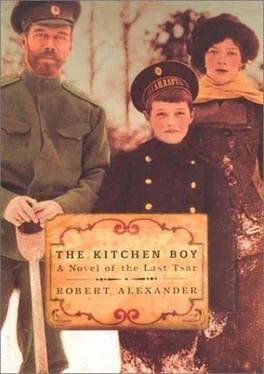Such a kind man was Nikolai II. So sweet. So tender. And gentle. He loved nothing more than his family and his country. He hated disagreements, either within his vast, squabbling house or among his ministers, both great and small, or anywhere else, for that matter, within his enormous realm. That was the Tsar I knew then, and the Tsar I’ve since grown to know in my books. Bloodshed was not at all what he wanted… and yet any fool would admit that that was his legacy. When Batyushka , the Dear Father, departed this world, he left behind a vast sea of blood, his own, his family’s, his country’s. Up until the ironfisted, totalitarian rule of the Red tsars – the kommunisty , who made the terrible Ivan look like a choir boy – his reign was one of the most violent in all the history of Russia. One must not forget that it was during the reign of Nicholas II that two disastrous wars, two bitter revolutions, and countless pogroms befell Holy Mother Russia. And though Tsar Nikolai wanted nothing more than to avoid violence, though many of the disasters were not of his doing, virtually all of them were his fault because he was Tsar, Russian Tsar, absolute Tsar, Orthodox Tsar. When you look back through the decades, it now seems utterly obvious that there was no way it could be done, no way an autocrat could rule so vast a country, at least not without complete terror and oppression. Why, during his arrest the former Tsar read the anti-Semitic, Protocols of the Elders of Zion , which he found “very timely reading matter.” He never learned, however, that the book was an entire fabrication, composed by his own tsarist secret police, whose duty it was to maintain order for their master, but who instead incited the hate and riots that toppled him. So in the end this is how Nikolai II must be viewed: a very caring man of moderate abilities who, although utterly devoted to his country, was unable to transform the unworkable autocratic system thrust upon him. Period. That simple.
You know, Tsar Nikolai and Comrade Lenin were like two great trains running toward each other at a colossal speed. The closer they came, the faster they went. They were traveling, however, on two entirely different sets of tracks, and so they should have passed by each other. They should have missed completely and zoomed on, racing toward their remarkable but very different destinations and goals. And yet… yet they collided head on with a great, terrible force, killing millions upon millions around them. And do you know why these two trains that were on two different sets of tracks collided so terribly? Because it was their fate, their destiny. And not just theirs alone, but all of Russia’s.
Forgive me. It’s true. I wander. I wander in my heart and my thoughts. Such is the curse of any emigrant, to abandon one’s home and never find another, to always flounder in a sea of remorse. Your dear grandmother handled it much better than I, but then again she was a far superior person in so many ways.
Well, then, fate marched on…
Later that day the Romanovs had a real obednitsa , a liturgy without communion, their first in three months. Aleksandra arranged a small altar all by herself, draping one of her shawls on a table, setting out her images – her treasured icons – and then surrounding them with birch tree branches. It was lovely in its simplicity. And she and the daughters sang quite nicely. Father Storozhev in fact came, and while we all wondered if he might bring a note or news of some kind, there was nothing. Nor could there have been, because the priest was escorted in by Komendant Avdeyev, who never left his side.
And then?
Well, later in the day the girls darned various linens with Nyuta, then helped their mother arrange their “medicines,” for this was an ongoing affair, their hiding of the last of their jewels. While the two suitcases of larger gems had been secretly left with the nuns in Tobolsk, you only have to peruse the last pages of Aleksandra’s diary to see evidence of their clandestine stitching of the smaller diamonds. “Arranged things all day, tatted.” “Tatyana sowed my j.” “Arranged medicines with Yevgeny Sergeevich.” “Arranged things, tatted, heart enlarged.” “Arranged things.” “Arranged things, tatted, read.”
Finally, on the morning of July 16, slightly more than twelve hours before they were all slaughtered, the long, secret task was complete. In the final journal entry of her life – the very one where she mentions how I was taken away – Aleksandra simply noted, “Olga & I arranged our medicines.” You see, it took the careful hands of all six women – the Tsaritsa, the four grand duchesses, as well as the maid – weeks to finish with the 42,000 carats, and doing so with precious little time to spare. As if they had sensed the hour of death was upon them, by noon of that day all the jewels were wrapped in cotton wadding, then packed and stitched ever so tightly into the double corsets of those beautiful girls, which of course proved such a horrible mistake.
The Tsar spent the rest of the day reading, pacing, and smoking at the open window. Later he had a sitting bath – I, myself, brought him hot water from the kitchen. Later yet he played bridge with his girls and bezique with Yevgeny Sergeevich. And thus, shortly after ten, concluded the twenty-third, a day which ended much more quietly than it had begun.
Did I say it was a Sunday?
I shall pass quickly over the twenty-fourth, which was fraught with tension only insomuch as nothing happened. Yevgeny Sergeevich remained in bed the entire day, as did the Empress, complaining yet again of an enlarged heart and aching eyes. Later, actually, she moved nearby the open window, where she read and played cards with Maria Nikolaevna. About this time, toward one o’clock, the rest of us were allowed into the garden. There we paced for forty minutes. The heat was tropical. Outside, in the full of sun, the temperature rose to thirty-seven and a half degrees, while inside the thick walls of the Ipatiev House it climbed only to a warm twenty-one and a half. Otherwise, we waited and hoped, but once again Sister Antonina and her novice failed to appear. I couldn’t help but think that either the nun had been discovered, or the supposed friends of the Tsar and his family had lost their nerve and abandoned us. Although no one else spoke of such doubts, I am sure everyone else felt them, for anxiety hung in the air like thick fog.
Tuesday, the twenty-fifth, began as the other recent days, warm and monotonous. Yevgeny Sergeevich was feeling better from his attack of the kidneys, but he remained in bed nevertheless. After breakfast I wheeled about the Heir, room to room, as was my usual morning duty. We were just passing from the main parlor back into the dining room when both Aleksei Nikolaevich and I heard voices from beyond the double closed doors. The guard room lay there, and I could hear deep, distrustful voices of the men and a single, small one that was full of morning brightness.
Unable to contain his excitement, the Heir twisted in the wheeling chaise, looked up at me, and whispered, “That’s Sister Antonina.”
“Da-s!”
I turned the chair around, aiming it toward the double doors, and the Heir clasped his hands in his lap and eagerly bent forward. I half-expected Jim – the huge Negro from America who’d been a fixture at the Aleksander Palace right up until the first days of the revolution – to swing open the door with his usual great pomp. Instead, however, one of the guards shoved open the door with his foot.
“ Pyat minut .” Five minutes, one of them ordered. “No more.”
“Of course, my son.”
Draped from head to foot in folds of black, the sister entered, her head bowed slightly as she tried to conceal a smile. She carried an open, woven basket, in which were nestled brown eggs, a good ten of them, and immediately behind her trailed Novice Marina, who clutched two chetvert of milk in her arms.
Читать дальше












